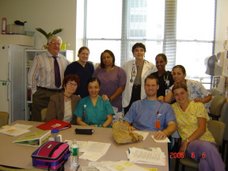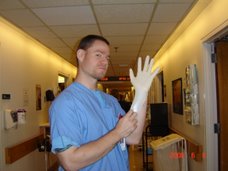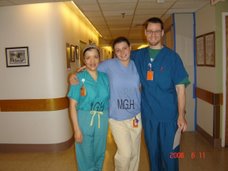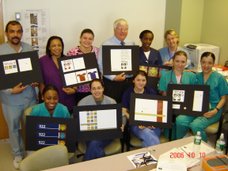
http://www.nursingworld.org/ojin/topic14/tpc14_3.htm
A CONTINUING CHALLENGE: The Shortage of Educationally Prepared Nursing Faculty
Ada Sue Hinshaw, PhD, RN, FAAN
Abstract
The profession is facing a unique shortage of nursing faculty. Schools of Nursing have always had a shortage of doctorally prepared nursing faculty. The academic norm for faculty teaching in baccalaureate and graduate programs to hold earned doctoral degrees was established later in nursing than for other disciplines. At best, 50% of nursing faculty in such programs have met this academic standard. In addition, the shortage is predicted to escalate in the next decade due to the retirement of a "graying professoriate" of nursing faculty.
The shortage of nursing faculty is interwoven with the current national shortage of nurses. The shortage of nurses requires the educational programs of the profession to supply more graduates. But the shortage of nursing faculty will limit student enrollments and likely decrease the number of graduates. Conversely, the shortage of nurses will offer many opportunities and choices to nurses and may decrease the number selecting graduate studies and an academic career, thus contributing to the shortage of nursing faculty
The shortage of nursing faculty will also have consequences for the generation of the knowledge base for nursing practice. With a decreased number of individuals to conduct research and the loss of senior investigators through retirement, continuing development of nursing's knowledge base may be curtailed. The shortage of nursing faculty will also limit the professional leaders who are able to shape health policy in the state, national, and international arenas.
This article outlines a number of factors influencing the shortage of nursing faculty. Several institutional School of Nursing strategies are suggested for countering the shortage situation. In addition, several national professional and policy strategies are suggested. More creative strategies need to be developed and evaluated by Schools of Nursing and by the profession.
A CONTINUING CHALLENGE: The Shortage of Educationally Prepared Nursing Faculty
Ada Sue Hinshaw, PhD, RN, FAAN
Abstract
The profession is facing a unique shortage of nursing faculty. Schools of Nursing have always had a shortage of doctorally prepared nursing faculty. The academic norm for faculty teaching in baccalaureate and graduate programs to hold earned doctoral degrees was established later in nursing than for other disciplines. At best, 50% of nursing faculty in such programs have met this academic standard. In addition, the shortage is predicted to escalate in the next decade due to the retirement of a "graying professoriate" of nursing faculty.
The shortage of nursing faculty is interwoven with the current national shortage of nurses. The shortage of nurses requires the educational programs of the profession to supply more graduates. But the shortage of nursing faculty will limit student enrollments and likely decrease the number of graduates. Conversely, the shortage of nurses will offer many opportunities and choices to nurses and may decrease the number selecting graduate studies and an academic career, thus contributing to the shortage of nursing faculty
The shortage of nursing faculty will also have consequences for the generation of the knowledge base for nursing practice. With a decreased number of individuals to conduct research and the loss of senior investigators through retirement, continuing development of nursing's knowledge base may be curtailed. The shortage of nursing faculty will also limit the professional leaders who are able to shape health policy in the state, national, and international arenas.
This article outlines a number of factors influencing the shortage of nursing faculty. Several institutional School of Nursing strategies are suggested for countering the shortage situation. In addition, several national professional and policy strategies are suggested. More creative strategies need to be developed and evaluated by Schools of Nursing and by the profession.




1 comment:
Hi Lin,
I was intrigued by your many articles relative to the nursing shortage and limited faculty prepared at a doctorate level. I graduated from a Diploma Nursing program in 1974. The educational level of my intructors had a BSN at best. At that time, one could walk in to any hospital and be hired on the spot, often without a formal inservice or training. While reading your articles, I refected on the life of a nurse way back when. Many of the nursing functions years ago included washing down beds and making the perfect four corner tucks in the sheets. Thirty plus years ago, we did hands on nursing and don't recall much assistance from support staff, not to mention technology. I am not sure how we did it all, but somehow, we managed. I have been on the Nursing Advisory Board at Cambridge College (CC)for over a year. CC is addressing the issues of the Nursing Shortage and need for increased Nursing Faculty. I am hopeful that nursing programs incuding an RN to BSN and a BSN to MSN will soon be added to the CC curriculum. Stay tuned for exciting news regarding the future of nursing programs. Keep up the great work and interest in making a better future for us all.
Mary Anne
Post a Comment